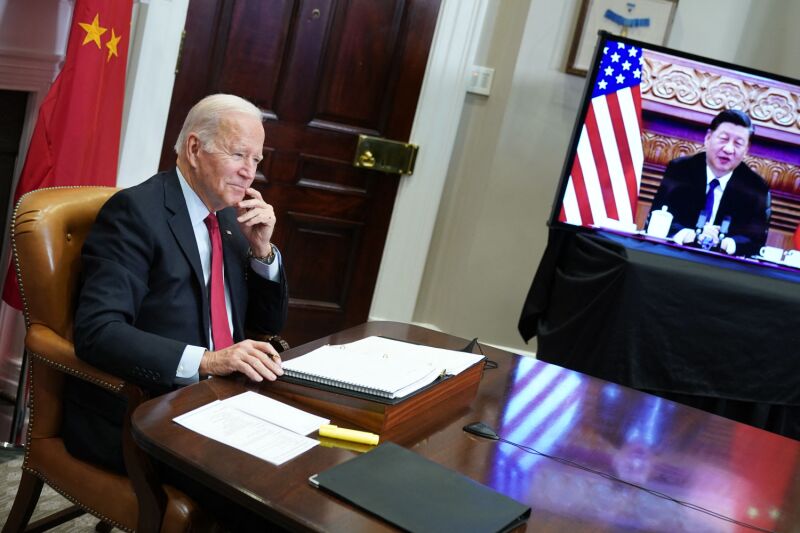Speaking in an interview with the website of the Strategic Council on Foreign Relations, Dr. Mahmoud Dehghan, referring to the remarks of the US Secretary of Defense remarks on accepting the “One China” policy and emphasizing the need for increased military cooperation in a telephone conversation with his Chinese counterpart, clarified Washington’s strategy regarding its relations with Beijing, said: The United States concluded a few years ago that with China’s progress it might lose the world’s largest GDP per capita, and if that happened, China could eventually eliminate the dollar from its trade and global transactions and cause the collapse of the US economy.
He added: Under such circumstances, the United States designed a trap for Russia, as an ally and support and defense shield of China, and silently opposed the annexation of the Crimean islands, encouraging it to occupy the Donbass region. In fact, by inciting the Russians in the region, the United States created the impression in Russia that it could re-implement its previous plan, and now seeks to incapacitate Russia in Ukraine.
US opportunity to separate Russia, China
Explaining that Russia initially lost the battle in the mind of public opinion and in propaganda, the university professor described the measures of the West against Russia in the Ukraine war and said: In the current atmosphere against Russia, China, despite some critical positions towards the West and support for Russia could not have taken any serious action in support of Russia, and it would have been subject to international sanctions if it had not cooperated with the West in dealing a blow on Russia’s economy.
Dehghan continued: The United States, by spreading the rumor that China wants to take advantage of the Russian invasion of Ukraine and occupy Taiwan militarily, entered its ships into the region and put a lot of psychological pressure on Beijing. Under such circumstances, China could no longer side with Russia, and the United States has found a great opportunity to separate Russia and China.
Reiterating that the policy pursued in the 1970s with the famous and secret visit of US Secretary of State Kissinger to Beijing and separation of China as a Soviet ally, had been re-implemented, he added: The US strategy now towards China is the same “stick and carrot” policy. On the one hand, they state that they accept the policy of One China, and on the other hand, they emphasize that it must cooperate with the West in sanctions against Russia; under the condition that China knows this accompaniment will deal a heavy blow on Moscow and at the same time on Beijing.
The US will not forsake Taiwan
The international affairs analyst, saying that the United States has so far won the game due to Putin’s miscalculation, regarding the prospects for US-China relations, despite close competition in the economic, scientific and technological fields, noted: China has reached a peak where, if it crosses, it will be ranked first in the world in terms of GDP. This is important for the United States. Under such circumstances, the United States will certainly not forsake Taiwan. In this regard, we are witnessing an increase in verbal tensions over the islands of the South China Sea between Taiwan and China in recent days, and Taiwan is trying to enlarge the runway of the disputed island of Taiping by 350 meters with the support of the United States in order to place fighter and anti-submarine aircraft in it.
Showing “carrots” to China
Emphasizing that the US acceptance of the “One China” policy is to show “carrots” to China to reconsider its relations with Russia, he referred to Beijing’s warnings against the visit of the U.S. House of Representatives Speaker to Taiwan and continued: On the one hand, Washington claims to adhere to the policy of “One China” principle, but on the other hand, it states that it will defend Taiwan in the event of a war between China and Taiwan! Under such circumstances, China avoids military conflict at the height of economic growth; because it is aware of the many harms that it may suffer in this regard.
Referring to the Wall Street Journal report, which had claimed that China was rapidly expanding its nuclear arsenal because of the fear of the US threat, the university professor added: China has vulnerabilities and does not want to enter into the competition field. Because at the end of such competition it will be affected. In fact, in this situation, China is playing slowly on the “rope” so as neither to get involved with the United States nor upset Russia.
“Accepting One China” not US policy to be implemented
Noting that some US officials have said the Ukraine crisis will continue for another two to three years and that they are seeking a long-term war of attrition, he said: The current calm in Beijing-Washington relations depends on China’s position. Given China’s economic considerations, it must reconsider its relations with Russia if it is forced to accept tendencies close to the West.
The international affairs analyst pointed to Europe’s cooperation with the United States in putting pressure on Russia and increased military budgets of those countries, and said: We are now witnessing the strengthening of NATO and the rift between Europe and the United States during the Trump era has been repaired; to the extent that some European countries have begun cooperating with the United States to put pressure on China. Under such circumstances, China is certainly exposed to numerous harms, and knows that what the United States is raising within the framework of “accepting One China” is not the implementing policy of that country, and that in the United States long-term objectives against Beijing have been designed.










0 Comments